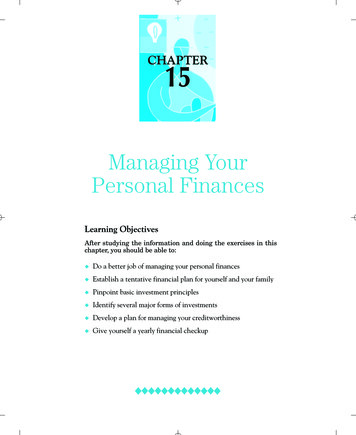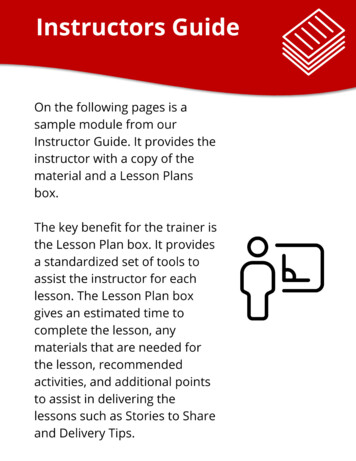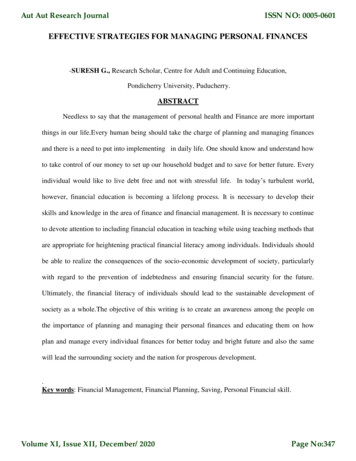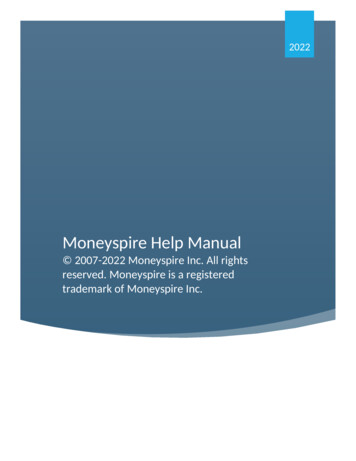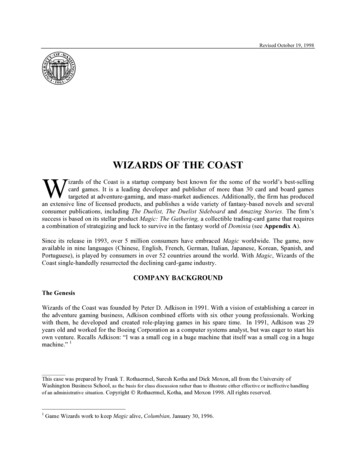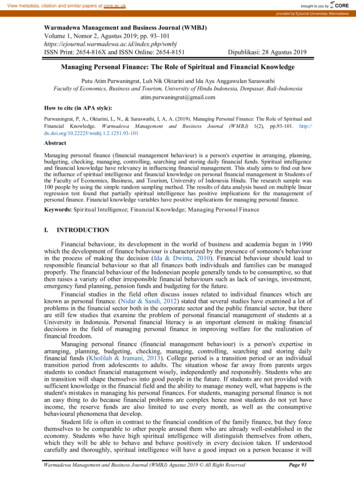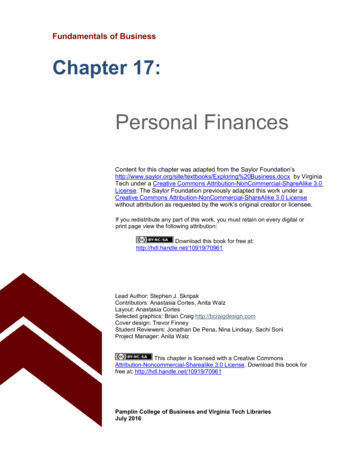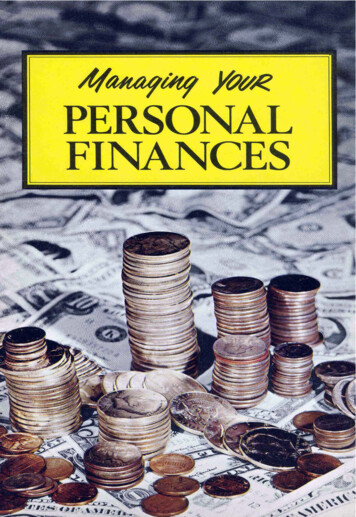
Transcription
# PERSONALFINANCES
,lla!tafih.f / ?PERSONALFINANCESby Paul W. Krolland the Ambassador College Research DepartmentPa odena, California
Copyrighi 1970Ambo"odorCollegeAll Ri l ts Reserve !
MORE MONEY!// criesthe average American11family. "Look at these bills" Howcan we ever get out of debt?"What a paradox! Americansearn more, and can buy morethan ever before- yet have morefinancial headaches!But WHY? What is wrong? Why such11 making ends meet?nworry overThis booklet makes the answers plain.It pinpoints mistakes made in handlingmoney and shows HOW you can en;oyprosperity without money worries.
7-t(,I .,.,,, ,J
FINANCIAL difficulty is a critical family prob-lem in the United States.Professional financial counselors receive thousands of letters from bewildered families asking "Howcan we get out of debt?" "Why are we having problems?""How can we budget our money?"Perhaps the most frequent plea is: "What are wedoing wrong?"Yes, what is wrong? Americans and other Westerners have more material goods than ever before. Whyshould there be increased financial problems in the midstof burgeoning material prosperity? Why such worry over"making ends meet"? Why do people have so manymoney problems?Why Financial Problems?This booklet gives practical answers to theseproblems. It pinpoints the mistakes people make inhandling their money; it shows how you can put yourfinancial house in order; it tells you how to really enjoythe truly good life.Let's begin by taking a critical look at the financialsituation of individual people - and the nation as awhole.For example, take the Franklins who live inPhoenix, Arizona. Their name, of course, has been
Managing YOUR PERSONALFINA CESchanged. The people, however, and their problems arereal.The Franklins were headed for financial catastrophe. Collectors from 25 different creditors werehounding them. Stan Franklin was expecting to getfired from his job at any time. Conversation at home wasone big squabble over money difficulties."Look at these bills," screamed Stan's wife Connie."It's your fault we're in this mess.""No it isn't," Stan roared back. "If you'd stopcharging all that stuff, we wouldn't owe so much."The long and bitter argument continued night afternight. At times they talked about going into voluntarybankruptcy. But the Franklins didn't file personal bank ruptcy. Rather, they solved their problem! They learnedhow to get out of debt- and stay out.A Problem of DebtThe Johnsons of New Jersey were in the samefinancial bind perhaps worse off. They werehopelessly swamped by bills. Creditors were literallybesieging them night and day. The electricity hadalready been turned off. The phone was to be disconnected shortly. A finance company was threateningto repossess their car.Yet, three years later the Johnsons were out ofdebt. "For the first time in years," they said, "we arefinally 'paid in full.' " It was a wonderful feeling.But how did they turn the tide? Their monthlypayments had added up to 306.50. Steve Johnson'smonthly take-home pay had amounted to only 515.The family was left with a meager 208.50 for all theexpense of living. With three small children, this wasobviously not enough.Yet they managed to pull out of debt. How didthey do it? This booklet will examine the steps whichpeople like the Franklins and Johnsons can take to putthemselves on a sure financial footing, a footing that
MmM ;in ;YOUR PERSO:-.IAL FINANCfSallows them to enjoy life and actually have more.But why do families lose this footing and get indebt in the first place? Why this great paradox of ourage: burgeoning affluence and a simultaneous increase infinancial problems?This paradox often stuns family financial counselors.The Affluent in DebtTake the case of the McBains. Husband Bobworked for a large oil company. He earned 10,000 peryear when that amount could purchase somewhat morethan it can today. Yet, except for a small checkingaccount and pension-plan deposits, the McBains did nothave a dollar in cash to their names. In fact, Bob andwife Jennie were spending about 20 per month morethan they earned.The McBains were having money problems typicalof an increasing number of young, good-income families.These misfit twins- good income and overindebtedness- often go hand-in-hand. The Family Service of NewHaven, in Connecticut, found that most families callingon the agency for help were in the 9,000 to 11,000 peryear salary bracket.But why? Why do such well-educated, highly paidAmericans have trouble with their finances? Why doapproximately 200,000 families declare personal bankruptcy EACH YEAR? More people resort to bankruptcytoday, than during the height of the depression!Why do millions of other families for years practicea kind of financial brinkmanship?Some authorities estimate that for every personalbankruptcy, at least twenty other families are havingdire financial problems.Many are living on meager incomes. They desperately need practical information on how to make themost of their money. But even the comparativelyaffluent endure frustration, a never-ending succession oftime payments, family squabbles over money, and a
Malhlging YOUR PERSONAL FINAI\'CESfeeling that the good life is escaping them. They can'tenjoy what they do have.Financial Worry Versus AffluenceBut why should this be? Americans today are virtually glutted with the physical trappings of our Age ofTechnology.Today, almost two in five families make over 10,000 per year; approximately one family in five enjoysan income of 15,000 or more. The median familyincome is 9,280. This represents a 75% increase infamily income over ten years ago. Even with inflation,the median income of 1970 packs 36 percent morebuying power than the 1960 income.Some 80 percent of American families have at leastone car. One in three families has two or more cars. Twoout of every three American families own homes. Onein every 11 homes is equipped with a swimming pool.Four out of five families have black and white televisionsets. One in four owns a color TV.On top of this, Americans spent more than 80 billion dollars in 1969 on leisure. That's a substantial totalof 400 per man, woman and child!Approximately 28 million Americans own stock incorporations. An amount equal to nearly 6000 per family is currently in savings accounts. The financial assetsof all Americans is close to the TWO TRILLION DOLLARmark.Then why this paradox? Why nagging worries intrying to make ends meet? Why, according to someestimates, is the average American family only threemonths away from financial failure.The answer is simple. Much of the United States'so-called prosperity is predicated on borrowed money.Too many Americans have borrowed too much.America's Private DebtThis borrowing spree adds up to a collective personal debt estimated at well over half a trillion dollars- a figure that staggers the imagination. This debt
Ma ging YOUR PERSONAL FINANCESincludes everything - home mortgages, installmentcredit, personal loans, charge accounts.If every person owed an equal amount of money, afamily of four would have an 11,300 debt.To further intensify the problem, assets and debtsare not evenly distributed. According to one study, 40percent of American families have NO SAVINGS at all!And, usually, these are the families heavily in debt.It is no wonder that a sudden emergency - anillness, an accident, a new baby, auto repairs - canbring financial disaster.Many simply have no money for emergencies or forpurchasing needed items on a cash basis. On top of this,since World War II, a new type of money psychologyhas made great inroads into the thinking of Americans.A large number of people no longer feel it necessaryor even financially wise to save. A new generation haslargely given up the maxim of money managementwhich once guided the prudent family.A New Money PsychologyMuch of this thinking stems from rising inflation. Adollar worth 100 cents in 1959 was only worth 76 centsin 1969. One authority estimated that a family whichtripled its income between 1939 and 1969 found itself nobetter off in terms of real purchasing power.As a result, millions of families are convinced that itdoesn't pay to save. Little by little, too many Americansare embarking on a "Buy now and pay later" spendingspree. Simultaneously, it has become increasingly possible to purchase anything from toothpaste to televisionon c;:redit.Consumer credit has leaped ahead. It rose over2000 percent from 1945 to 1970. In the decade from1950 to 1960, consumer credit more than doubled. Itmore than doubled again in the 1960-1970 decade.Without realizing it, multitudes of Americans areabusing their "no money down and fifteen dollars amonth" way of life. Increasingly, the average person is
Managing YOUR PERSONAL FINANCESliving from paycheck to payment. In too many cases,payment is due BEFORE paycheck!One authority estimates that the "average American" has pledged close to 15 percent of his incometoward monthly installment obligations. Further estimates are even more disturbing. When all short-termdebts - including charge accounts - are taken intoconsideration, the percentage of debt-tagged income isstaggering. Average Mr. and Mrs. America has earmarked 20 percent of their paycheck to meet payments!Sidney Margolius, family finance expert, calculatesthat those who owe money often must pay 25 percent ormore of their income to creditors.Age of Credit BuyingThe result of this new money psychology is obvious.Short-term personal debts are leaping ahead alarmingly.The total jumped from less than 6 billion in 1945to 90 billion by 1965. By early 1970, consumerdebt was estimated at over 120 billion. This did NOTinclude mortgages, farm debts, bank loans. Amazingly,one family out of every 33 is in hock to the creditorsto the tune of 40 percent or more of its income.Business statistics revealed that Americans owed 36BILLION dollars in mid-1969 on the cars they drove.According to the University of Michigan SurveyResearch Center, approximately 66 percent of all newcars are purchased on credit. Used cars are bought ontime in 46 percent of the cases, according to thisestimate.Appliances fare little better. Approximately 39 percent of all refrigerators and 35 percent of all cookingranges are said to be bought on credit. In fact, homefurniture and appliances are purchased on the installment plan in at least 30 percent of all cases.Our Money ProblemsOther authorities claim these items are boughton credit in larger percentages. Whatever the real statis-
Managing YOUR PERSONAL FINANCEStics, it is clear that Americans are buying heavily onthe instalhnent plan.And, they are often in financial trouble.The intensity of the trouble is partially revealedby garnishee rates. A garnishment occurs when acreditor seizes a large part of the debtor's wages. Thisis usually one step before the individual declaresbankruptcy.The Cook County Circuit Court in Chicago hasrecorded as many as 85,000 garnishees a year. One largeChicago employer, Inland Steel, revealed that as manyas 10 to 30 percent of all employees have been garni sheed in recent years. Los Angeles courts reported115,000 in 1965. Akron and its surrounding area have20,000 a year. Detroit had 52,000 garnishees in 1965.Increased and over extended use of credit is bring ing this type of financial h:irdship to millions. Someexperts are worried.Charles Neal is one. He is a financial counselor oflong experience. He is familiar with the whole spectrumof money problems. For several years, Mr. Neal wasDirector of Financial Counseling for the AmericanInstitute of Family Relations. Speaking of bankruptciesin particular, Neal said:"The cause in almost every case was OVERUSE ofcredit- in other words, impatience to have all thegoodies of life."In order to get credit, a family must have income.Bankruptcies in these times usually can be blamed onpoor management, not on lack of income." (CharlesNeal, Sense With Dollars, New York: Doubleday andCompany, 1968, page 1.)Almost all bankruptcies are "no asset" cases. Yet,each has obviously been using credit liberally - tooliberally. Supposedly, they are amassing the goodthings of life on credit. But what has happened tothem?Americans are simply buying first and saving later
Ma11 1ging YOUR PERSONAL FINANCES- if at all. They have formed the habit of borrowing.Without thinking, millions dutifully tum to the bank,the credit card, the time payment plan.Seldom, it seems, are they able to pay off whatthey owe.The Problem With CreditThe consumer is largely to blame for misusing thecredit available. Some of the guilt rests on basic economic misconceptions - in particular the idea thatindustry must produce more and more. At the sametime, we are told that we must CONSUME this productionat an ever-increasing rate."Out of this we have been forced to become a nationof consumers. We must consume at an ever-increasingrate in order that the goods of our production (whichitself must continue to climb) do not become pure overproduction." (Rex Wilder, Macmillan Guide To FamilyFinance, New York: Macmillan, 1967, page 5.)Few people stop to ask: "Is this really the rightway to do it?" As a result Americans are buying more ofeverything than ever before. We are taught throughadvertisements that we SHOULD buy more - and do itnow! And we like to do it. After all, it's pleasant toacquire things rapidly. But is this always good? Can weoverextend our credit without dire consequences?Our "Buy, Buy, Buy" SocietyIt has been said that we are bombarded with fifteenor sixteen hundred advertising messages per day. Mostof them beat the gong for "More purchases - andnow!" "Take a vacation." "Buy this refrigerator.""Keep up with the new style." "Purchase a home."In forging this advertising barrage, marketers haveone overall purpose in mind.American social critic Vance Packard summarizedthe approach in the following way: "As the marketingexperts groped for ways to keep sales soaring in the faceof mounting saturation, one of the first thoughts that
Managing YOUR PERSONAL FINANCESUstruck them was that each consumer should be inducedto buy more of each product than he had been buying."The way to end glut was to produce gluttons." (VancePackard, The Waste Makers, New York: Pocket Books,1960, page 25.)The result? You live in a society that has artificially stimulated consumption to keep productiongoing. Such a society, if it isn't careful, could comecrashing down.Of course, Rome wasn't built in a day and neitherwas our consumer society. There was a time whenAmericans WAITED for what they wanted until they couldafford it. Today, such an attitude is considered virtuallysubversive and just a bit naive.Charles Neal, expert in family finance, runs intothis "buy now, pay later" attitude and its drastic effecton the average consumer.A Nation of ConsumersSays Neal: "Having counseled thousands of personsface to face, I know how easy it is to get trapped on afinancial treadmill. Every day we are urged to live better, "higher on the hog" - and inrmediately - notlater."Keeping up with the Joneses is no joke; it is thevery essence of modern-day American living. Even themost solemn and thrifty economists plead with us topart with our cash and use our credit liberally. After all,they say, if we don't spend freely, the economy maysuffer, and who knows, we might all be out of jobs."(Charles Neal, Sense With Dollars, New York: Doubleday, 1968, page 2.)Credit ltas been hailed as the way to have what youwant sooner. "If you paid cash, you'd never have all thatyou enjoy," the promoters tell you.This isn't telling the whole story. It may, temporarily, change the time of your purchase. However, a familywith NO debt and a good income can purchase most
14Managing YOUR PERSONAL FINANCESeverything within a matter of a few months. The troublewith this is that most families are so far in debt, theyhaven't seen this principle work.Credit does not give you "greater buying power."In fact, credit ultimately decreases your buying power.Remember, you do pay at least 15 percent extra- andoften much more - to the creditor for the items youbuy on time.If your income is sufficiently large, you can affordmost of what you need anyway. And if you can't affordan item without credit, you need to ask yourself BEFOREyou buy: "Can I really afford this?" If you can't,beware!Our CREDIT EconomyCredit has also been deified as the savior of oureconomy. "Why, it has built our mass industries," crythe manufacturers. "Take a look at the auto industry."This idea - that credit built the industry - isopen to question.In some cases, the effect has been merely to divertspending from one industry to another. For example, therailroad industry was once a backbone industry. Today,it has been largely relegated to a second-rate status. Theauto has been one factor in demoting railroads.For another point, credit has not caused anincrease in recent car sales. From 1963, car productionhas remained generally static at eight to nine million.However, auto installments jumped 80 percent from 20billion to 36 billion in the years 1963-1969. Obviously,more credit doesn't necessarily increase sales. There is alimit.Nevertheless, manufacturers have literally floodedthe market with new gadgets. Much of the time totempt you to buy more - and on credit. Constantly,the cry is to upgrade. Exchange the black and white TVfor a color model; get a new car with greater horsepowerand modern styling; trade in the white range for a built-
lW.anaging YOUR PERSONAL FINANCESin green one; add on another room; get a power mowerwith a driver's seat.One publication put its finger on the problemwhen it said: "The advertising industry has, to usethe phrase of one budget advisor, turned us into anation of 'wanties.' "But how many people can really afford a new home,a swimming pool, two cars, a color television, threeweeks' vacation - all at the same time?Few can.Young Couples and CreditYoung couples expect to immediately have thestandard of living which took their parents years toachieve: Many families make large purchases BEFORE theincome for such expensive items is really available.Financial disaster often strikes!A Southern banker estimated that 50 percent ofconsumer bankruptcies involved people under 29. Theusual age range of bankrupt families appearing before anOregon bankruptcy referee happened to be in the 23-to35 age bracket.People who spend unrealistically to gratify someimmediate desire often do not realize what they're doingto their financial stability. After all, they have been toldthat they should expect more now. This, they areadvised, is part of the great American dream. GET whatever you like, whenever you like. "Buy now, thinklater."What can you do about the situation? Simply, don'tbuy. Don't buy until you can afford it.Should YOU Use Credit?This, of course, doesn't mean you should never usecredit. In our credit-oriented society you will probablyfind it helpful to use credit occasionally. A good creditrating can be an asset if used wisely.The editors of the J. K. Lasser Tax Institute summarized it well. "Plainly, the smart money manager uses
Managing YOUR PERSONAL FINANCES17credit cards instead of cash," they wrote. Then theyadded this penetrative thought. "But he does so knowing that he could have paid cash if he so wished; and hedoes not charge items or services he would not otherwisehave bought." (Managing Your Family Finances, by theJ. K. Lasser Tax Institute, New York: Doubleday,1968, p. 84.)Besides, credit cards are handy to have. It mightsave a lot of frustration, say, if your car breaks down onthe road. It could turn a disaster into a minor inconvenience. Credit cards also prevent you from having tocarry large sums of cash.Of course, most of us use credit all the time. Forexample, we buy electricity, gas, water, use of the telephone, on credit. That is, we use the services first andthen pay for them.However, credit is a convenience! And you do payfor the service. In some cases, as with oil company creditcards, you need to make the purchase anyway. Itdoesn't matter if you use the cards or not. This is thetype of "credit" paid off without a visible charge. Youusually do, however, pay higher prices for the item orservice.There may be times when it is essential to usecredit. For example, few people can afford to purchase ahouse on a cash basis.At other times, credit may save you money. Forexample, suppose you have several children. You have todo extensive washing and drying of clothes. It may beless expensive to purchase a washing machine on creditthan to continually trek to the "washateria" and pay forwashing and drying. Plus you would gain the extra convenience of being at home.The same might be said for a freezer. Can youAmba,ador CollegeP oloCREDIT CARD EXPLOSION- According to some estimates,200 million credit cards are outstanding in the United States.As early as 1967, the volume of sales on credit cards passed 12 billion.
Managing YOUR PERSONAL FINANCESafford to buy bulk meat and a freezer- and save moneyin the long run?There are legitimate and money-saving uses ofcredit. But credit use must be handled maturely, discreetly and very carefully.The credit system has been extended to so manypeople- and is so easy to obtain- that too many takeit for granted. And they abuse it by buying too muchbefore they can really afford to buy.Can You Afford It?The sensible person must realize that no matterhow much he makes, he will never have enough moneyfor everything he would like to buy.Yet, too many people simply have not thoughtthrough the significance of that simple statement."Credit is available, so why not use it," they reason.Later, they wake up to the painful facts of life. Humandesire out of control is the real culprit.It is characteristic of human nature to live justbeyond one's means! It is also a driving human motivation to acquire material goods - even though you can'tafford them. After all, that's why people use and abusecredit. You can now buy something you cannot affordby borrowing someone else's asset.One might ask himself this pertinent question: "IfI can't afford it- should I have it?" Painful though itmay be, those in debt must face up to the reality of theirfinancial position! This desire to have what one cannotafford is often at the root of the overindebtedness problem. There are, of course, other causes which we willexamine.The bewildering array of easy credit doesn't helpthe debt-ridden family. Neither does the "you-owe-it-toyourself" advertising barrage. As a result, people buywhen they can't afford it. The end result is obvious. It'scalled overindebtedness.Of course, people have always used credit and
Managing YOUR PERSONAL FINANCES19abused it. In past generations entire families were soldinto slavery to pay off a debt. Or they went to prison.Today people sell themselves - and often their children- into financial slavery. "The borrower is servant[slave] to the lender" (Prov. 22:7). That is a simplestatement of fact.The more we owe others, the less we often reallypossess.We have become a "renter" rather than an ownersociety. Take your car for example. You are probablymaking a never-ending succession of monthly paymentson your car. You are in effect "renting." A thirty-yearmortgage on a house means you are little more thanrenting that home for a good portion of your life.Many other items with built-in obsolescence are,indeed, rented. The "owner" is paying payments on thecommodity - sometimes long after it has worn out.This has had a devastating effect on the way we viewand manage our money.When to BuyWe are being conditioned to accept the "time-payment plan" as the way to handle money. Let's explain itthis way. Under a very limited credit system, cash wasrequired for nearly all consumer goods and services. Aperson had a built-in automatic control on mostspending desires and decisions.He simply asked himself one question: "Do I havethe money to purchase this item?" If he did, fine. But ifthere was no cash available, his decision of "I can'tafford it" was already made.It kept his human desire in bounds!The economics and psychology of the matter wassimple. There was no frustration; no worrying aboutunpaid bills; no fear of some unforeseen catastrophe putting him financially under.But our credit society has transformed all that. The
Managing YOUR PERSONAL FINANCESaverage conswner has been conditioned to debt. As aresult, his economics has gotten complicated. And inspite of afHuence, Mr. Average American generally feelsin a financial pinch."Under the system [a credit economy] . thequestion is no longer 'Do we have the money?' but 'Canwe afford it?' The latter involves a much more complexequation, and there is no built-in yes or no signal towhich you can look for an answer." (Carlton Smith, R.P. Pratt, and the Editors of Time-Life books, The TimeLife Book of Family Finance, New York: Time-Life,1969, page 11.)Therefore, it becomes easy to reason around thefact that you cannot afford an item. Most people wouldhave to admit they can't afford 500 for a color TV. But 18.50 per month for three years - now that's different. Or is it?How Not to Handle MoneyMost people simply aren't equipped to handle theirfinances in this complex manner. It requires extensiveeducation in economics and allows too much latitude tothe desires of human nature. Indeed, the question mightbe: "Should people handle their purchases in this wayat all?"In a McCalls' magazine survey a shocking conclusion was reached by the investigators. "The overwhelming impression was that many an American showsa naivete, a lack of realism and a kind of carelessness inhis spending career that would probably get him fired ifhe were to display these same qualities to the samedegree in his . earning career." ("How Women FeelAbout Money," McCalls, July, 1964, page 76.)Millions of Americans have an appalling lack ofH. .Arm lrongRobotTt PhotoA CONSUMER GARDEN OF EDEN- Department stores,as other "supermarket" establishments, feature a vast varietyof desirable goods easily available on credit. Many peoplebuy such goods on impulse.
Managing YOUR PERSONAL FINANCESknowledge about the credit system they use so liberally.They are not even aware of how much credit coststhem.According to one survey published in the Journal ofMarketing and recorded by Hillel Black, "Approximately two thirds of the users of installment credit didnot know the amount of the carrying charges or interestrate on their most recent installment purchase." (HillelBlack, Buy Now, Pay Later, New York: Pocket Books,page 74.) Hopefully, the "Truth in Lending" law hasmade this knowledge easier to acquire. But it stilldoesn't educate the populace to the cOmplexities ofcredit. Most shoppers are concerned only with the question, "How much is that per month?"An Ohio credit bureau manager was quite frank onthe wisdom of the average consumer. "We feel that anincreasing number of people are not competent tohandle credit. In our study locally, we feel that 25 percent of consumers are unable to handle extensive credittransactions." (Sidney Margolius, The Innocent Consumer Vs. The Exploiters, New York: Trident Press,1967, page 53.)Financial expert Margolius admitted that, "Comprehensive financial counseling for average income families remains one of the great unmet needs of our time."(Sidney Margolius, How To Make The Most of YourMoney, New York: Meredith Press, 1969, Preface.)Lack of TrainingIt is this lack of knowledge and experience inrightly handling personal finances which is at the bottom of many a family money problem.Most people have been trained as money earners not as SPENDERS! A man may be an expert in runninga computer, and fail miserably in running a budget. Hemay be a whiz at managing a supermarket, and flopin managing his budget. Few people have been taughthow to spend money sensibly.In the remaining pages of this booklet, seven
Managi.tg YOUR PERSONAL FINANCES23important principles of financial success are discussed.·Each is a vital key to help you make the most of manag·ing your income.What, then, must be done?Where should you begin?Principle No. 1 -EDUCATE YOURSELFSimply put, this is education about personal finances- and yourself!In today's complex financial world, suchknowledge is absolutely necessary. A person musthave some education about credit, insurance, how tobuy a car or home - plus all the other factors involvedin spending money - if he is to keep his financial housein order.If you plan to purchase a home, find out all you canabout home buying. How much will it cost? What areyou getting yourself into? What obligations will youhave? Do the same for any other purchase.Thinking of borrowing money? Find out all the different places where you can get credit. Is it really worthit? Understand thoroughly how much the credit will costyou.In the back of this booklet is a list of books andpamphlets available on all aspects of money manage.ment and spending. The average consumer should readand study at least one of them.A person must also have knowledge aboutHIMSELF!He must understand himself for what he is. Face upto the fact that his desires very often outrun his income.In other words, he shouldn't let himself be talked intobuying something he cannot afford.But what salesman, what advertiser, what manufacturer asks a potential buyer: "Have you analyzed yourfinancial situation? Can you really afford this product
24MaWlging YOUR PERSONAL FINANCESyou want to buy from me? Will this benefit your family?" Precious few bring up such questions.A Common TrapLack of training in handling finances is directly tiedin with another common problem.Couples simply START spending foolishly!The situation begins something like this. A couplewants to get married. She is 17 and he is 19. (Approximately 50 percent of all brides in the UnitedStates are in their teens. More first babies are bornto girls of
Managing YOUR PERSONAL FINANCES tics, it is clear that Americans are buying heavily on the instalhnent plan. And, they are often in financial trouble. The intensity of the trouble is partially revealed by garnishee rates. A garnishment occurs when
